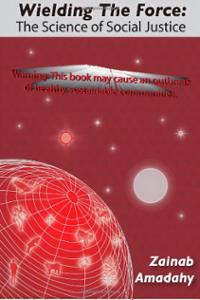Please support our coverage of democratic movements and become a supporting member of rabble.ca.
In her opening pages of Wielding the Force: The Science of Social Justice, Zainab Amadahy highlights the work of a French Buddhist monk who also has a PhD in molecular genetics — I did my undergrad in microbiology so, I was pretty excited to see that! — to clarify that the worlds of “science” and “spirit” are not mutually exclusive; rather they are overlapping.
Amadahy’s book is a compendium of information on the science of social justice and healthy communities.
From the outset, the definition of science is reclaimed. A scientist, as Amadahy describes, is not necessarily a specialist in quantum physics, they are anyone receiving and processing information in the natural world. A scientist includes those trained in “ceremonial protocols, sacred medicines as well as special songs and dances.” Disrupting the traditional Western dichotomy of logic versus emotion, she writes “To the Indigenous scientist, thoughts and feelings matter in the seeking out and application of knowledge.”
Amadahy argues that healthy movements are built on a paradigm of relationality — building critical social, emotional and spiritual connections and relationships — which in turn, create an “upward spiral of responsibility, generosity and appreciation.”
This is certainly not a novel claim, but what is most interesting about the book is that this claim is supported by knowledge about the physical world and spiritual forces. Social Darwinism and survival of the fittest — the supposed sociological foundation for individualism and capitalism — is challenged through counter-theories on evolution, which emphasize symbiosis and cooperation. Amadahy cites the work of scientists and oceanographers who document how the role of violence and competition in evolution has, in fact, been overemphasized.
During my recent trip to the Allied Media Conference (AMC), emergence theory was a focus on numerous workshops. In natural science, emergence theory is the philosophy used to describe complex systems and patterns that arise from the multiplication and amplification of simple interactions amongst cells or organisms.
At the AMC opening, Adrienne Maree Brown described certain patterns of emergence: “Birds don’t make a plan to migrate, raising resources to fund their way, packing for scarce times, mapping out their pit stops. They feel a call in their bodies and they must go, and they follow it, responding to each other, each bringing their adaptations. Oak trees don’t set an intention to listen to each other better, or agree to hold tight to each other when the next storm comes. Under the earth always they reach for each other, they grow such that their roots are intertwined and create a system of strength which is as resilient on a sunny day as it is in a hurricane.”
One of the more interesting parts of Amadahy’s book for me was her take on self care. Unlike many Eurocentric models of self care, Amadahy is explicit in connecting self care to community care. She challenges theories of wellbeing that are “self involved,” and instead emphasizes, as many others have, a framework of interconnectedness and interdependence.
Connecting this to her aforementioned views on relationality, she summarizes: “Healthy sustainable communities recognize our interconnectedness with and interdependence on each other as well as the other species of the planet; where individual wellbeing is understood to be crucial to that of the community and community wellbeing is crucial to that of the individual; and where relationships among communities contribute to globalized wellbeing.”
This is a critical addition to ongoing activist discussions about envisioning self care — the necessity of care and wellbeing to ensure sustainability, while at the same time challenging dominant narratives of self care that rely on and reproduce capitalism and individualism.
As healing practioner Yashna Maya Padamsee writes in a piece titled Stop Talking About Self-Care: “self care, as it is framed now, leaves us in danger of being isolated in our struggle and our healing. Isolation of yet another person, another injustice, is a notch in the belt of oppression. A liberatory care practice is one in which we move beyond self care into caring for each other.”
In response to these shortcomings, many women of colour and disability justice activists have been developing an alternative framework of healing justice. As articulated in one of the founding principles of Healing Justice by some revolutionary healing practioners, “we are interconnected with many communities, struggles and legacies who have joined healing and resiliency practices with liberation in their work for centuries.”
The book also imparts tangible advice on living well. Apparently, calling up feelings of compassion, appreciation, and gratitude for five minutes a day results in five hours of heightened immunity and lowered stressed levels.
As activists, we all strive to be guided by values of justice, righteousness and empathy. Amadahy combines these values with what she calls the “heart’s own intelligence.” Her book is an important contribution to the growing body of work connecting scientific knowledge (particularly non-Western traditional knowledge bases) to social movement theory.
Harsha Walia (@HarshaWalia) is a South Asian writer and activist based on Vancouver, Canada on the unceded lands of the Musqueam, Skwxwú7mesh, and Tsleil Waututh. She has been active in anti-racist, migrant justice, feminist, anti-capitalist, Indigenous solidarity, and anti-colonial movements for over a decade. She is currently involved in No One Is Illegal, Women’s Memorial March Committee, South Asian Network for Secularism and Democracy, and Defenders of the Land network. Her book Undoing Border Imperialism is forthcoming.



